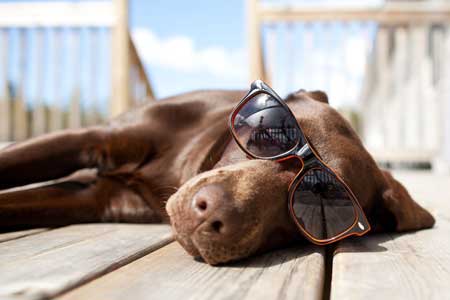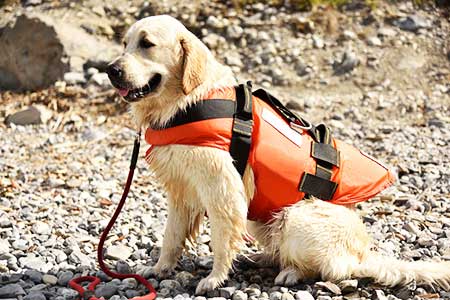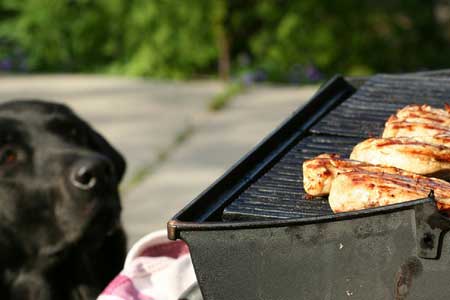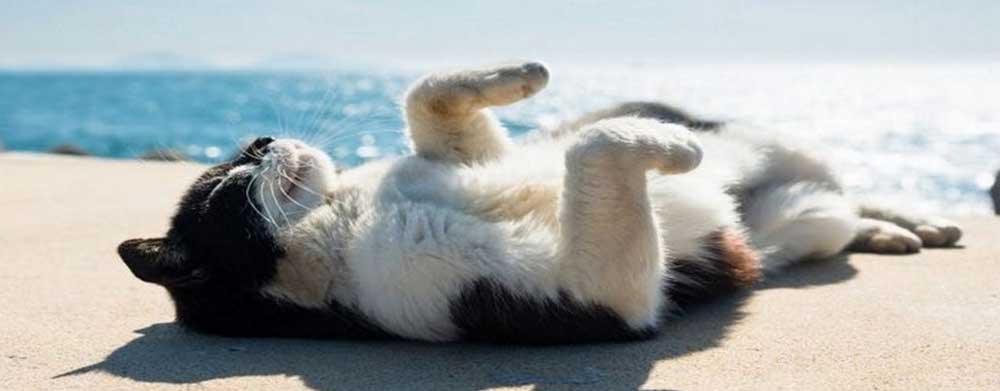Keep your Pet Safe this Summer
Give your furry outdoor friend the best chance to stay happy, healthy and safe
When summer comes around following the long, cold winter, we all love to get outdoors and enjoy the sun's warmth and the associated wellbeing of feeling its rays on our backs. Our pets are no different, however, when we get too hot or feel like our skin is burning we move into the shade to protect ourselves and cool off. Don't assume that your pet will naturally have the same instinct.

Sunscreen can help protect their skin against burning, and is especially beneficial for white and short-haired animals that are more prone to burning. Noses and ears of all pets need to be considered for their potential to burn if out in the sun for too long also and there is increased risk if these areas have cuts or wounds.
Be mindful of where they are, whether they have enough water handy, and whether there is risk of them burning or overheating.
The following provides brief guidance on how you can reduce your pet's risk of adverse events in the warm summer months:
Never leave your pet in a parked car
- On a warm day, temperatures inside a vehicle can rise rapidly to dangerous levels, causing organ damage, and even death.

Use pet-friendly sunscreen
Skin cancer is common in dogs and cats:
- Even though fur provides some protection from the sun, you should apply a pet sunscreen every 3 to 4 hours to the least hair-covered spots: noses and bellies on dogs (especially ones who like to lie on their backs), and ears on cats.
- Try to keep your pet out of the sun during the middle part of the day where possible.
- Do not use human sunscreen – it is toxic to pets.
Provide shade and water
- Any time your pet is outside, make sure they have protection from heat and sun and plenty of fresh, cold water.
- Tree shade and tarpaulins are ideal because they don’t obstruct air flow.
Watch out for grass seeds
- Foxtail grasses can embed in eyes, ears, noses, paws and skin, often requiring surgical removal.
- Check your pet thoroughly after being outdoors, especially if they have been in long grass.

Be water-wise
- If you’re a boatie, consider having your pet wear a life vest in a bright colour.
- Beware of currents and riptides.
- If a dog gets in trouble in one of these, whether swimming or caught in a wave while fetching a ball, they can be swept out to sea in minutes. The same goes for rivers.
Limit exercise on hot days
- Exercise your dog in early morning or evening hours.
- Footpaths and roads get very hot and can burn your pet’s paws, so walk dogs on the grass.
- Always carry water with you to keep your dog from dehydrating.
- An easy way to judge how hot the footpath is to place your hand on the pavement - if it’s too hot for your hand, it is too hot for your pet’s paws.

Have a pet safe BBQ
- Define the perimeter for their movement - keep your dog away from the grills, as the grills remain hot for several hours even after turning off the flames.
- Keep a check on sharp objects - if your pet is hovering around the place refrain him from entering the areas that have been used to dispose rubbish or put rubbish directly into bins and not left in plastic bags until later.
- Keep foods away that can be toxic - foods like onions, garlic, fruit salad, etc. can prove to be toxic for animals. Try to keep these types of foods out of reach of your pet.
- Sugary foods, and Christmas and holiday treats like chocolate and fruit mince pies are also toxic to pets and should be kept inaccessible to them as they can create gut problems.
- Don't share any of your BBQ food - scraps and fatty leftovers can cause pancreatitis in animals and may lead to severe abdominal pain or death.
- Corn-on-the-cob and peach pips are also a big problem because they can lodge in a dog’s intestines.
- Keep the pets way from alcohol - alcohol should never be left unattended around pets, especially in case of dogs the ethanol in alcoholic drinks is highly toxic and can be deadly.
- Make sure there is a shady place for your pet to sit in as direct exposure to heat can invite a lot of problems. It is also possible that your pet can develop heatstroke from excessive heat emitted during the BBQ session.Be mindful of extra hydration requirements in these conditions.
Print out an info sheet and keep it to hand

11572